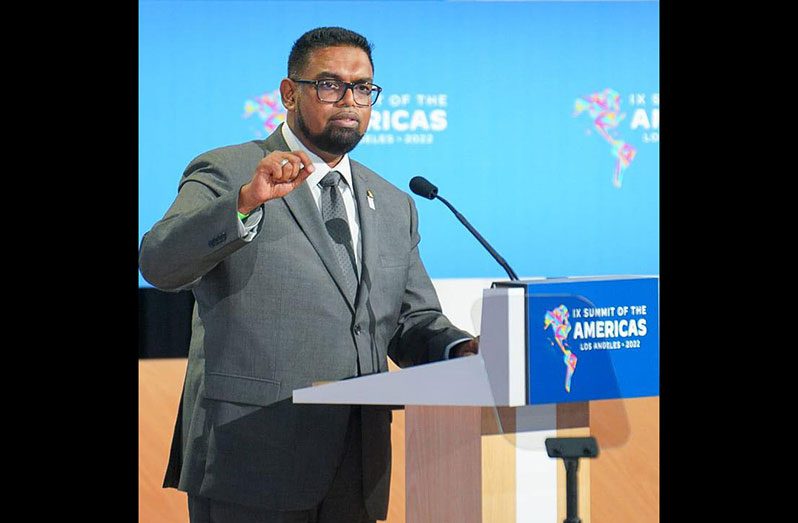– President Ali tells hemisphere’s leaders; urges solutions to shared challenges
PRESIDENT, Dr Irfaan Ali, on Friday, advocated that it was time for leaders of North, South & Central America and the Caribbean to have fact-based discussions to uplift the people of the hemisphere to a position of prosperity.
The President made those remarks during his inaugural presentation at the Ninth Summit of the Americas in Los Angeles, California, U.S.A., where he noted that leaders must be able to have frank discussions to resolve systemic issues, putting political and ideological differences aside.
The Guyanese Head-of-State said he was convinced the hemisphere’s leadership was ready for those types of frank and fact-based conversations.
He added that while there was encouragement to set up committees examining issues of food security, climate change, energy security, and financing, such should be expanded to the whole of the Americas.
“Let us say to the people of this region, that as political leaders, we are ready to tie ourselves to the time-bound initiatives in delivering to them the prosperity we all speak of.
“We need, as a region, to have these tough conversations that are necessary to make the best possible decisions for the people of this region,” President Ali said.
He noted that when addressing the conference’s theme of “Building a sustainable, resilient and equitable future,” it was important to look at issues of democracy, good governance, fairness, and security among others.
In addition to that, the President noted that when addressing those issues, there must be a realistic analysis of the current state of affairs in the Americas.
Supporting his call with data, President Ali highlighted that, in 2019, some 7.4 per cent of the population in countries in the Americas were affected by hunger.
The President added that the situation had gotten worse over the last five years as there had been an increase in undernourishment by 13.2 million people.
As it related to climate change, Dr Ali told the Summit that changes in climatic patterns were expected to cost the region hundreds of billions of US dollars annually.
These changes, he mentioned, will continue to disrupt crop cycles and yields even as the number of extreme weather events in Central America has increased by 3 per cent annually in the last 20 years.
“The Amazon, the world’s largest reservoir of biodiversity and carbon, is described as highly vulnerable to drought. Exposure to drought increased from 8 per cent between 2004 to 2005 to 16 per cent in 2015 to 2018,” President Ali said.
This, he iterated, had led to an increase in tree mortality and declining productivity in the forests in North America over the last few decades. Further, the projection between 2021 and 2050 is that average temperatures are expected to rise to about 2.5 degrees Celsius in the United States.
Meanwhile, the President stated that the COVID-19 pandemic pushed some 4.7 million people out of the middle class, while a large percentage of persons experienced job loss.
Further, he told the Summit that the education gap mirrors the income gap between the rich and the poor, even as levels of inequality in Latin America are among the highest in the world.
The data showed that remote learning was challenging for those children who live in the most disadvantaged areas.
However, in order to solve these and other issues, the President said that it was only collective action that will ensure that the prosperity being sought is built on good governance, democracy, and the rule of law.
“We are living among these challenges in a region that has the potential to be fully energy secure, bring prosperity to every home, have the greatest access to natural resources, abundant land and access to water resources to ensure food security; enough rain forests, and technology to make a meaningful contribution to climate change, enough access to finances to bridge inequality and support sustainable development for all,” President Ali said, questioning why the region has not been able to achieve this.
As a result, he noted that it points to systemic issues which require honest conversations as it relates to resolving these systemic problems.
“I was happy to be part of a meeting yesterday with President Biden and Vice President Harris, and we are convinced that the leadership is ready for this frank, fact-based conversation,” he said.
These tough conversations must be had and were necessary, he said, for leaders to be able to make the best possible decisions for the people of the region.
To this end, President Ali indicated that Guyana had been affected by all of the issues he mentioned. He especially highlighted Guyana’s experience of a threat to democratic institutions and values.
Even while facing challenges, the President said Guyana still remains among the best in the world for managing its forests as the current deforestation rate is around 0.05 per cent.
As Guyana’s economy is projected to double in size within two years as the world’s fastest-growing, Dr Ali said the country was not alone.
He told those gathered at the Summit: “We belong to the family of humanity, and we are ready to make our contribution to that family of humanity. We cannot be reckless, and we will not be irresponsible in managing these resources in the interests of the world and in the interests of this region.”
With Guyana’s resources along with the potential of Suriname, Trinidad and Tobago, and even possibilities through investment in exploration with gas in Barbados, President Ali noted that the region can be made energy secure.
As such, he urged leaders to get together and have the conversation that defines a pathway to energy security for the region, adding that not only does the potential exist, but all available tools and assets are available and can and should be used in order to reach the potential.
Meanwhile, he said, “This conference must also define a pathway for integration of infrastructure, people and economies. It is important that we have that conversation on how we’re going to integrate our people or economy and infrastructure.”
With that, he indicated that the people of the region expect that the conference will point to solutions and an action-oriented agenda to address all of the issues that will provide them with a better future.
“Let us take collective responsibility at this conference to fix the problem and fix the system in the interests of the people of this hemisphere. Let us forge ahead to unite the Americas, strengthen our relationship forged in respect and good governance,” the President said.




.png)









